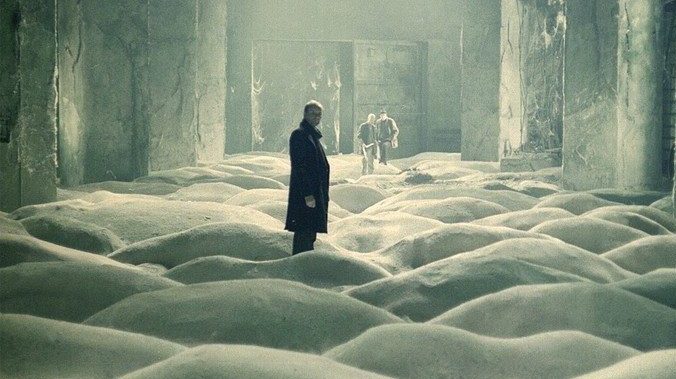Stories about alien encounters can also be about encounters with god (or gods, or God). Technology beyond our human capabilities that seems miraculous. Exhortations to peace and love. Hellfire and death raining down from above. A chance to ascend to the stars. An intelligence with motivations completely inscrutable to human minds.
In Arkady and Boris Strugatsky’s 1972 novel Roadside Picnic, our alien/gods are enigmatic and largely absent- they visited a few locations on Earth once in the past, and then took off again, leaving behind contaminated Zones littered with debris. Exploring the Zone presents serious health risks: contagion follows people who lived in the Zone when the Visit occurred, mutations occur in the offspring of those who venture into the Zone’s heavily guarded borders. The debris found in the Zone is also extremely valuable on the black market. Risk-taking “stalkers” sneak into the zone to bring back alien objects, most of which seem to defy all human understanding of physics. Self-replicating batteries, unbreakable canisters that can contain a mysterious liquid despite seeming to have no actual sides to contain anything, gem-like objects that refract light at non-Euclidian angles. There’s also hell slime, a viscous ooze that dissolves and destroys nearly everything it touches, and death-rays, and all sorts of ethereal, deadly hazards.
Some of this junk seems miraculous- scientists manage to develop cars that use the batteries- but much of it has no practical purpose on Earth. It’s turned into jewelry or fruitlessly pored over in research facilities. Or else it’s completely, untouchably lethal, a cancer radiating out into humanity, irrevocably changing it. It’s human to try to impose narrative or meaning on things, but in this case it’s impossible to distinguish the miraculous from the malevolent. Late in the book, a conversation between two characters illuminates one perspective- the aliens who left behind this stuff had no idea we were there at all.
A picnic. Picture a forest, a country road, a meadow. Cars drive off the country road into the meadow, a group of young people get out carrying bottles, baskets of food, transistor radios, and cameras. They light fires, pitch tents, turn on the music. In the morning they leave. The animals, birds, and insects that watched in horror through the long night creep out from their hiding places. And what do they see? Old spark plugs and old filters strewn around… Rags, burnt-out bulbs, and a monkey wrench left behind… And of course, the usual mess—apple cores, candy wrappers, charred remains of the campfire, cans, bottles, somebody’s handkerchief, somebody’s penknife, torn newspapers, coins, faded flowers picked in another meadow.
The idea that these technological gifts/curses are just thoughtless litter is more horrifying even than the physical destruction. The gods are indifferent, their purpose inscrutable, because there isn’t one. “Man is born in order to think … Except that I don’t believe that. I’ve never believed it, and I still don’t believe it, and what man is born for -I have no idea. He’s born, that’s all. Scrapes by as best he can.”
Roadside Picnic is a novel that defies easy conclusions, that challenges the idea that you would even hope for such a thing. It’s grimy and working class, illustrating the destabilizing effects of a shifting, uncertain reality on its very human characters. Western sci fi often explores its thematic premises directly within the text – “what if aliens treated humans the way we treat animals?” “what if robots staged an uprising?” “what if phones, but too much?” By contrast, the Strugatskys set up a detailed premise without using direct allegories- which is not to say it doesn’t feel immediate and vital. There are of course shades of Soviet bureaucracy, craven capitalism, and oppression. The unsettling unpredictability of the Zone also parallels bombardment by propaganda, where reality is no longer something that can be understood, in the traditional sense (as relevant in 2018 America as it was in 1972 Russia). There is perhaps a critique of unrestrained tech development: the promise of utopia contrasted with a reality that is just piles of glittering garbage. None of this is necessarily explicit in the text. Instead, the novel is suffused with an atmosphere that invites you to explore it from any angle, to live and breathe within it.
There’s a need to understand, but that doesn’t require knowledge. The God hypothesis, for example, allows you to have an unparalleled understanding of absolutely everything while knowing absolutely nothing … Give a man a highly simplified model of the world and interpret every event on the basis of this simple model. This approach requires no knowledge. A few rote formulas, plus some so-called intuition, some so-called practical acumen, and some so-called common sense.


